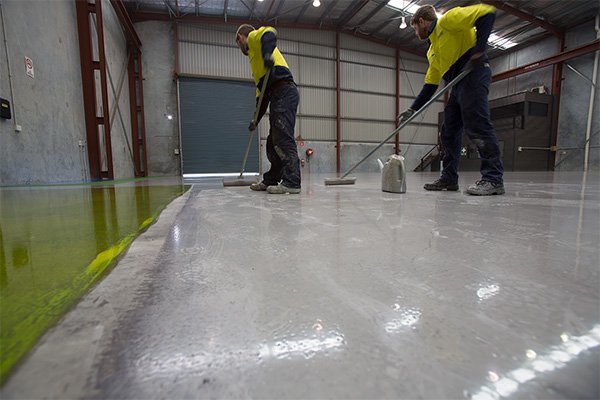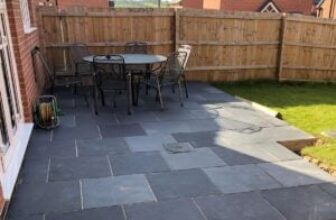
How to Choose the Best Epoxy Flooring Contractor
Epoxy flooring is renowned for its durability, aesthetics, and cost-effectiveness, making it a top choice for residential, commercial, and industrial applications. However, achieving a flawless finish requires the expertise of a skilled contractor. This guide outlines the technical considerations and key metrics to help you select the best epoxy flooring contractor.
1. Understanding Epoxy Flooring
Epoxy flooring consists of a thermosetting resin that, when combined with a curing agent, creates a rigid plastic material. This flooring system typically includes multiple layers, with the thickness measured in mils (1 mil = 0.001 inches):
- Primer Layer: 2-3 mils thick. This layer ensures adhesion to the substrate and seals the concrete.
- Base Coat: 8-10 mils thick. Provides the primary colour and embeds decorative flakes if used.
- Topcoat: 4-6 mils thick. Offers protection and a glossy finish.
The total thickness of an epoxy floor can range from 16 to 125 mils, depending on the application:
- Thin-Mil Systems (16-24 mils): Ideal for residential garages and light commercial areas.
- Medium-Mil Systems (40-60 mils): Suitable for commercial spaces with moderate traffic.
- High-Mil Systems (100+ mils): Designed for industrial environments with heavy machinery.
2. Research and Referrals
Start your search by focusing on contractors who specialise in epoxy flooring. A general contractor may lack the specific expertise needed for high-quality epoxy installation.
- Referrals and Reviews: Seek referrals from those who have installed epoxy floors in similar settings. Online platforms can also provide insights, but pay attention to reviews that mention the contractor’s ability to meet deadlines, handle unexpected issues, and deliver consistent quality.
3. Experience and Expertise
Experience is critical in epoxy flooring, particularly in understanding the nuances of different epoxy systems. Look for contractors with at least 5-10 years of experience in epoxy flooring installations.
- Portfolio Review: Ask for a portfolio that includes details such as:
- Square Footage: Projects ranging from 500 to 10,000 square feet can indicate versatility.
- Type of Epoxy: Confirm they have experience with 100% solids epoxy (which offers the highest durability) and water-based epoxy (which is more cost-effective but less durable).
- Case Studies: Inquire about specific case studies where they solved complex challenges, such as moisture issues (relative humidity >85%) or floor preparation in contaminated environments.
4. Credentials and Certifications
Ensure the contractor is properly credentialed. Key certifications to look for include:
- NACE Coating Inspector Program: Ensures expertise in surface preparation, coating selection, and application.
- ICRI Concrete Slab Moisture Testing: Important for testing moisture levels in concrete (moisture levels >4% can compromise epoxy adhesion).
- Manufacturer Certifications: Verify if they are certified installers for specific epoxy brands (e.g., Sherwin-Williams, Sika, Rust-Oleum).
Licensed contractors will also adhere to local building codes and standards, ensuring the project meets regulatory requirements.
5. Quality of Materials
The longevity and performance of your epoxy floor depend on the materials used. Here’s what to look for:
- Epoxy Solids Content: 100% solids epoxy is the most durable, offering a compressive strength of up to 10,000 psi and tensile strength of 3,500 psi. Lower solids content (e.g., 50%) results in a thinner, less durable coating.
- Hardness: Measured on the Shore D scale, where higher numbers (e.g., 80-85 Shore D) indicate greater resistance to scratches and dents.
- Chemical Resistance: Check the chemical resistance of the epoxy to ensure it can withstand exposure to acids, alkalis, solvents, and other harsh chemicals commonly found in industrial environments.
6. Surface Preparation
Surface preparation is critical for epoxy adhesion and long-term durability. A reputable contractor should follow these steps:
- Moisture Testing: The contractor should conduct moisture testing using methods such as ASTM F2170 (Relative Humidity Testing) or ASTM F1869 (Calcium Chloride Testing) to ensure moisture levels are below 3 pounds per 1,000 square feet per 24 hours.
- Surface Profile: The concrete should be prepared to a CSP (Concrete Surface Profile) level of CSP 2-4 for thin-mil coatings or CSP 5-7 for thicker systems. This involves techniques like shot blasting or diamond grinding to create the necessary texture for epoxy adhesion.
7. Customer Service and Communication
Effective communication is essential for ensuring the project stays on track. The contractor should provide:
- Detailed Proposals: Look for proposals that include square footage, material specifications, labour costs, and timelines. A well-detailed proposal should outline every aspect of the project, including preparation, installation, and curing times.
- Project Management: The contractor should assign a project manager who will be your primary point of contact. They should provide regular updates, including daily progress reports and any deviations from the plan.
8. Pricing and Value
Pricing for epoxy flooring can vary widely based on the scope and complexity of the project:
- Cost Per Square Foot: Expect costs to range from £3 to £12 per square foot depending on the type of epoxy system and surface preparation required. Thin-mil systems (16-24 mils) are on the lower end, while high-mil industrial systems can reach the upper end of this range.
- Lifetime Costs: While initial installation costs are important, consider the long-term value. High-quality epoxy floors can last 15-20 years with minimal maintenance, significantly reducing lifetime costs compared to other flooring options.
9. Site Visit and Final Decision
Before finalising your decision, visit a site where the contractor has recently completed an epoxy flooring project. Here’s what to inspect:
- Uniformity and Finish: Check the floor for uniformity in colour and texture. The surface should be free of bubbles, fisheyes, or other imperfections.
- Adherence to Specs: Ensure the finished floor meets the specified mil thickness using a mil gauge or similar tool.
- Client Feedback: Speak to the property owner about their experience with the contractor, particularly regarding adherence to the timeline, quality of work, and after-installation support.
Conclusion
Selecting the best epoxy flooring contractor requires careful consideration of their experience, technical expertise, and the quality of materials they use. By focusing on these metrics and ensuring thorough communication, you can confidently choose a contractor who will deliver a durable, aesthetically pleasing epoxy floor that meets your specific requirements. Remember, investing in the right contractor is crucial to the success and longevity of your epoxy flooring project.







